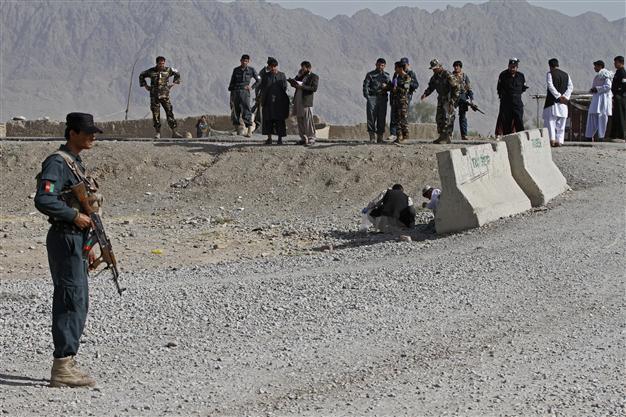Taliban denies responsibility after suicide attack kills 3 Turkish engineers in Afghanistan
KABUL, Afghanistan

An Afghan policeman stands guard after another bomb explosion in Kabul, Afghanistan, Thursday, May 29, 2014.
A suicide bomber yesterday killed three Turkish engineers and wounded another in eastern Afghanistan in the latest attack on foreigners in the war-torn country, while Taliban denied responsibility.
“Around 7:15 am, a suicide bomber detonated his explosive-packed motorbike, targeting a minibus that belongs to Turkish engineers in the Behsud district of the province of Nangarhar,” Ahmad Zia Abdulzai, a spokesman for the provincial governor, told Agence France-Presse. “As a result of this attack, three Turkish engineers were killed and a fourth was wounded.”
Abdulzai said the victims were working on the construction of a police center in Nangarhar and were traveling to work when their minibus was attacked.
Foreign Ministry condemns attack The Turkish Foreign Ministry condemned the attack and called on Afghan authorities to swiftly arrest the perpetrators. In a written statement, the ministry offered condolences to the families of the victims, Fuat Taş, Ümit Ünal and Halil Gül, who were working for the EMTA Construction Company. The company specializes in construction of special purpose buildings for U.S. Army and U.S. State Department facilities in Turkey.
According to figures released by the Afghan Chamber of Commerce, the trade volume between the two countries has increased by 30 percent in the last two years, while Turkish companies have made investments worth $3 billion in the country.
Hazrat Hussain Mashriqiwal, spokesman for the Nangarhar police chief, said an Afghani child was also injured.
The attack is the latest incident targeting Turks in abroad. A convoy carrying Turkey’s consul to Mosul, Öztürk Yılmaz, was targeted by a bomb late last month, while Saadettin Doğan, a security official for Turkish Airlines, was gunned down last week in Mogadishu. Last year, al-Qaeda linked al-Shabaab militants staged a suicide attack on a Turkish Embassy annex, killing a Turkish guard and wounding three others.
Turkey has 459 soldiers in the NATO-led forces in Afghanistan, but unlike its European allies, their mission is limited to patrols and its troops do not take part in combat operations.
There was no claim of responsibility for the attack. Taliban spokesman Zabiullah Mujahid rejected claims that his group carried out the attack, saying they had good intentions toward the Turkish people.
'Other groups'
"Turkish people have a religious bond with Afghan people. We always love Turkish people. That's why, we can never organize such an attack intentionally," Mujahid said, pointing to other groups in Afghanistan as potential culprits behind the latest bombing.
The Taliban kidnapped eight Turks last year in April but later released them. The eight were taken captive by the Taliban in Afghanistan’s eastern Logar province when their helicopter was forced to make a “hard landing.”
The Economy Ministry said on its official website that 40 Turkish citizens were kidnapped in Afghanistan in the last decade, with most of them being rescued. However, four Turkish citizens were killed in the incidents, it said. The number of Turks killed in mine blasts is not included, the ministry said, adding that security precautions were highly crucial.
The attack came after the U.S. and Taliban sealed a dramatic prisoner swap that saw soldier Bowe Bergdahl released for five senior insurgent figures, raising hopes for peace, as foreign forces prepare to withdraw.
It also comes as Afghanistan is in the middle of presidential elections, with former Foreign Minister Abdullah Abdullah and ex-World Bank economist Ashraf Ghani due to compete in a head-to-head run-off vote on June 14. Both candidates have promised to bring peace after decades of conflict. But they will have to tackle a challenging security situation without NATO combat troops, all 51,000 of whom will pull out by the end of this year. U.S. President Barack Obama last week outlined the U.S. strategy to end America’s longest war, saying the 32,000-strong U.S. deployment in Afghanistan would be scaled back to around 9,800 by the start of 2015.
The remaining forces will be halved by the end of 2015 before eventually being reduced to a normal embassy presence with a security assistance component by the end of 2016.
The U.S. troops will stay only if a key security pact, the Bilateral Security Agreement, is signed between Kabul and Washington. Outgoing president Hamid Karzai has refused to sign the pact, but both presidential candidates have vowed to do so if elected.
